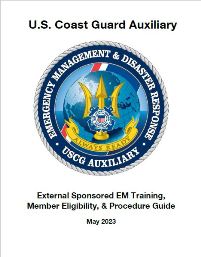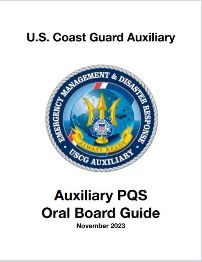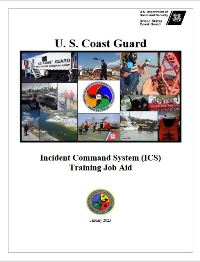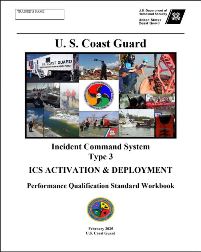Return to Q-Directorate's Home Page.
Tue, 28 Oct 25
As a member of the Auxiliary, you must have IS-100, An Introduction to the Incident Command System, and IS-700, An Introduction to the National Incident Management System, as part of your core training. If you have not taken those courses yet, or need to take a current version for a PQS, you can find the links for them below.
Many PQSs require more advanced training, as well as many Auxiliary positions. Frequently you will need IS-200, Basic Incident Command System for Initial Response; IS-800, National Response Framework, an Introduction, ICS-210, Initial Incident Commander, ICS-300, Intermediate ICS for Expanding Incidents, and even ICS-400, Advanced ICS-Complex Incidents. You will note the difference between some courses as “IS” and “ICS.” “IS” is an Independent Study Course at the FEMA Emergency Management Institute. “ICS” courses tend to be residency courses, available either via the Auxiliary online (in limited cases), locally provided by the Auxiliary or other agencies, or via a state-sponsored event. Links to those courses are also found below.
The USCG Aux External Sponsored EM Training, Member Eligibility, and Procedure Guide, provides access to all State and Territory training sites. Auxiliarists can find training on some courses allowed as substitutes for USCG's required courses. Your DSO-EM can provide authorization for those courses. You can also find the USCG Auxiliary Oral Board Guide, which explains and offers opportunities for Auxiliarists to complete the Oral Board section of their PQS. Example questions for ICS Qualifications for many PQs's are also available to help members prepare.
Finally, two PQS are highly recommended as the first PQS qualifications to reach for. They are limited in scope but can be a true learning experience for the entire program. Links to the basic USCG ICS Training Job Aid and ICS Activation & Deployment Performance Qualification Standard (PQS) workbook (formerly ICSSTAFF) are provided below. This is designed as a general knowledge verification before someone is deployed into an ICS position during an event, it provides a good synopsis of the information you are required to know. This course is required before deployment, so whether you complete it now or not, it will be required eventually. It might be wise to complete it early on since it covers the basics found in IS-100, 200, 700, & 800.
Links to the referenced IS and ICS Courses:
IS-100, An Introduction to the Incident Command System
IS-200, Basic Incident Command System for Initial Response
ICS-210, Initial Incident Commander (Aux Classroom Login Required, See FEMA Catalog)*
ICS-300, Intermediate ICS Expanding Incidents
ICS-400, Advanced ICS-Complex Incidents
ICS-700, An Introduction to the National Incident Management System
ICS-800, National Response Framework, an Introduction
Many PQSs require more advanced training, as well as many Auxiliary positions. Frequently you will need IS-200, Basic Incident Command System for Initial Response; IS-800, National Response Framework, an Introduction, ICS-210, Initial Incident Commander, ICS-300, Intermediate ICS for Expanding Incidents, and even ICS-400, Advanced ICS-Complex Incidents. You will note the difference between some courses as “IS” and “ICS.” “IS” is an Independent Study Course at the FEMA Emergency Management Institute. “ICS” courses tend to be residency courses, available either via the Auxiliary online (in limited cases), locally provided by the Auxiliary or other agencies, or via a state-sponsored event. Links to those courses are also found below.
The USCG Aux External Sponsored EM Training, Member Eligibility, and Procedure Guide, provides access to all State and Territory training sites. Auxiliarists can find training on some courses allowed as substitutes for USCG's required courses. Your DSO-EM can provide authorization for those courses. You can also find the USCG Auxiliary Oral Board Guide, which explains and offers opportunities for Auxiliarists to complete the Oral Board section of their PQS. Example questions for ICS Qualifications for many PQs's are also available to help members prepare.
Finally, two PQS are highly recommended as the first PQS qualifications to reach for. They are limited in scope but can be a true learning experience for the entire program. Links to the basic USCG ICS Training Job Aid and ICS Activation & Deployment Performance Qualification Standard (PQS) workbook (formerly ICSSTAFF) are provided below. This is designed as a general knowledge verification before someone is deployed into an ICS position during an event, it provides a good synopsis of the information you are required to know. This course is required before deployment, so whether you complete it now or not, it will be required eventually. It might be wise to complete it early on since it covers the basics found in IS-100, 200, 700, & 800.
Links to the referenced IS and ICS Courses:
IS-100, An Introduction to the Incident Command System
IS-200, Basic Incident Command System for Initial Response
ICS-210, Initial Incident Commander (Aux Classroom Login Required, See FEMA Catalog)*
ICS-300, Intermediate ICS Expanding Incidents
ICS-400, Advanced ICS-Complex Incidents
ICS-700, An Introduction to the National Incident Management System
ICS-800, National Response Framework, an Introduction
* ICS Courses in Aux Classroom are found in the FEMA Course Catalog



